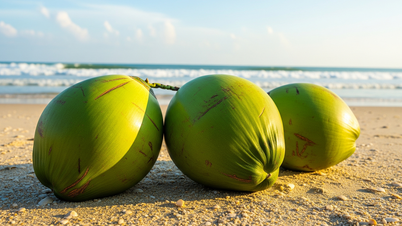Coconut water is a nutritious choice for rehydration, and also offers many health benefits, including heart and kidney benefits.
Not only does it have a natural sweetness and thirst-quenching properties, coconut water also contains many important nutrients, especially minerals that many people often lack.
Here are 7 scientifically documented health benefits of coconut water:
1. A source of many essential nutrients
Coconut trees grow in the tropics, and botanically, coconuts are classified as fruits.
Coconut water is the clear liquid contained in young coconuts that nourishes the fruit as it develops. As the coconut matures (10-12 months), some of the water is converted into white coconut meat, while the rest remains as coconut water.
Coconut water is usually taken from young coconuts about 6-7 months old, on average one coconut has 1/2-1 cup of coconut water.
Coconut water is 94% water, very low in fat, and should not be confused with coconut milk, which is made from grated coconut with added water, and is higher in fat and lower in water.
One cup of coconut water (240ml) contains about 60 calories, along with the following nutrients: Carbohydrate: 15g; Natural sugars: 8g; Calcium: 4% of the recommended daily intake; Magnesium: 4% of the recommended daily intake; Phosphorus: 2% of the recommended daily intake; Potassium: 15% of the recommended daily intake.
2. May have antioxidant properties
In the body, metabolism produces free radicals - unstable molecules. When too many accumulate, they cause oxidative stress, damage cells and increase the risk of disease.
Animal studies show that coconut water contains antioxidants, which can reduce the harmful effects of free radicals.
2012 study: In insulin-resistant mice fed a high-fructose diet, coconut water reduced free radical activity while lowering blood pressure, triglycerides, and insulin.
2014 study: Damaged livers of rats showed significant improvement in oxidative stress when given coconut water.
2016 study: In mice fed a high-fat diet, coconut water reduced cholesterol and demonstrated “potent antioxidant capacity.”
However, there are currently no human studies on the antioxidant effects of coconut water.

3. May help lower blood sugar in people with diabetes
Some animal studies suggest that coconut water may help lower blood sugar and improve health markers in diabetes.
2015 study: Diabetic rats given coconut water maintained better blood sugar levels, while also reducing hemoglobin A1c (an indicator of long-term blood sugar control).
2021 study: Diabetic rats showed significant reductions in blood sugar when given coconut water.
Additionally, coconut water is a source of magnesium, which helps increase insulin sensitivity and aids blood sugar control in people with type 2 diabetes or prediabetes.
Coconut water contains carbohydrates, which are converted into sugar in the body. Diabetics should consult a doctor or nutritionist before taking it.
4. May help prevent kidney stones
Drinking enough water is important for preventing kidney stones. In addition to plain water, some small studies suggest that coconut water may be more effective.
Kidney stones form when calcium, oxalate, and other compounds crystallize in the urine. About 12% of the world's population has had kidney stones.
2013 study: In rats with kidney stones, coconut water helped prevent crystals from sticking to the kidneys and urinary tract, and reduced the number of crystals that formed.
2018 study: In 8 people without kidney stones, drinking coconut water increased the excretion of potassium, chloride, and citrate, helping to eliminate minerals and reduce the risk of stone formation.
Although promising, more large-scale studies are needed to confirm efficacy in humans.
5. May support heart health
Coconut water may help reduce the risk of heart disease.
2008 study: Mice fed a high-fat and cholesterol diet supplemented with high doses of coconut water for 45 days reduced cholesterol and triglycerides comparable to statin drugs.
2005 study: suggests that coconut water may help lower blood pressure in people with high blood pressure, although more data is needed.
One important reason: coconut water is rich in potassium - 500mg in 240ml. Meanwhile, potassium has been shown to help lower blood pressure in both people with high and normal blood pressure.
6. Beneficial after prolonged exercise
Coconut water can be the perfect choice to replenish fluids and electrolytes after exercise.
Electrolytes (potassium, magnesium, sodium, calcium) play an important role in fluid balance. Because coconut water is rich in electrolytes, many studies show that it is better than plain water for post-workout recovery.
2014 study in Brazil: In hot conditions, coconut water improves exercise performance better than water or sports drinks.
7. Delicious and natural water supply
Natural coconut water is sweet, slightly fatty, low in calories and carbs.
It’s best to drink it straight from the fruit, but there are many bottled brands available. When buying, read the ingredients carefully to choose 100% coconut water, avoiding those with added sugar or flavoring.
Coconut water can also be used as a base for smoothies, chia seed pudding, salad dressing, or as a substitute for water when a little natural sweetness is desired./.
Source: https://www.vietnamplus.vn/loai-nuoc-giup-giai-khat-chua-cac-khoang-chat-ma-nhieu-nguoi-thuong-thieu-hut-post1057513.vnp



![[Photo] Parade to celebrate the 50th anniversary of Laos' National Day](/_next/image?url=https%3A%2F%2Fvphoto.vietnam.vn%2Fthumb%2F1200x675%2Fvietnam%2Fresource%2FIMAGE%2F2025%2F12%2F02%2F1764691918289_ndo_br_0-jpg.webp&w=3840&q=75)


![[Photo] Worshiping the Tuyet Son statue - a nearly 400-year-old treasure at Keo Pagoda](/_next/image?url=https%3A%2F%2Fvphoto.vietnam.vn%2Fthumb%2F1200x675%2Fvietnam%2Fresource%2FIMAGE%2F2025%2F12%2F02%2F1764679323086_ndo_br_tempimageomw0hi-4884-jpg.webp&w=3840&q=75)




































































































Comment (0)